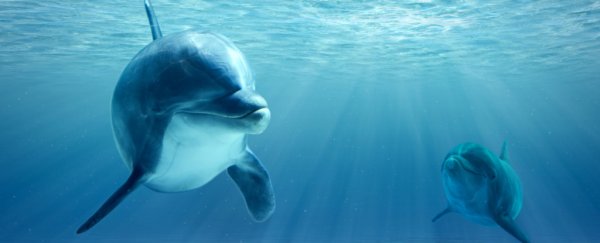If dealing with the ravages of Alzheimer's in humans wasn't enough, the neural disease has now shown up in dolphins, marking the first time it's been spotted in a wild animal.
A new study found protein plaques and tangles, usually the tell-tale signs of Alzheimer's in humans, in the brains of dolphins that had died naturally in the wild. It follows the discovery of the same biomarkers in chimps earlier this year, though in that case the animals were all kept in zoos and research centres.
According to the international team of researchers, while the discovery might be bad news for dolphins, it could give us more clues as to how the disease gets started in the brains of humans, and how we might work towards finding a cure.
"It is very rare to find signs of full-blown Alzheimer's disease in non-human brains," says lead researcher Simon Lovestone, from the University of Oxford in the UK.
"This is the first time anyone has found such clear evidence of the protein plaques and tangles associated with Alzheimer's disease in the brain of a wild animal."
Both human beings and dolphins are unusual creatures in the way they live well beyond the age at which they can reproduce, and that's one of the reasons scientists wanted to see if dolphins could also have an age-related health problem like Alzheimer's.
Sure enough, the research uncovered the same abnormal protein fragments in dolphins – plaques of the amyloid beta protein, and tangles of the tau protein – that are thought to lead to Alzheimer's in human beings.
These plaques and tangles kill off brain cells over several years, causing memory loss, cognitive difficulties, problems with communication and eventually death.
Exactly how the brain deterioration affects memory and thought in dolphins isn't yet clear, but the discovery potentially gives us another avenue for studying the disease and understanding more about it.
Mouse models currently used to study Alzheimer's aren't very good substitutes for the human version of the disease, and dolphins could hypothetically be a better match – which means more relevant research and, eventually, better treatments.
Further study will be required to take a closer look, but the researchers are advising against breeding dolphins in captivity for this purpose. The dolphins used this time had died naturally and were recovered from beaches in Spain.
"This study shows the importance of comparative research when considering important questions," says one of the team, Danièlle Gunn-Moore from the University of Edinburgh and the Roslin Institute.
"Non-human animals have so much to tell us about dementia, not just as models for Alzheimer's disease in people, but also to improve our understanding of dementia in these animals."
The research goes further than Alzheimer's though: it could also teach us more about the relationship between diet and lifespan.
It's thought that the human body has already evolved to adjust its insulin signalling to wring out a few extra years of life, and the researchers suggest that Alzheimer's and related problems such as diabetes are the price we pay for that longer life.
Discovering the same signs of wear and tear in dolphins, with whom we share long lives, backs up that idea – and at the same time is bad news for the hypothesis that carefully controlling the calories in your diet can add years to your lifespan, a hypothesis that has been recently proposed following tests on mice.
To put it another way, the anti-ageing processes seen in mice when their calories are restricted have already been maxed out in humans by the evolution of our species.
"If we are right, then it is already too late, by tens of thousands of years," says Lovestone. "That's about how long ago in our evolution we are likely to have acquired the insulin resistance that gained the extended lifespan that calorie restriction would produce."
"While a sensible diet has obvious health benefits and is important for avoiding premature death from avoidable obesity-related conditions, we think that extreme calorie restriction will not extend the human lifespan."
The research has been published in Alzheimer's & Dementia.
